The Best 10 Alternatives to Stream Security (+ Pricing & Reviews)
Twingate Team
•
Jul 27, 2024

Stream Security provides a Cloud Detection and Response (CDR) solution that offers real-time posture impact analysis, threat detection, and response capabilities to secure cloud environments. While it may not be the choice for everyone, it excels in real-time threat detection and cloud security. This article explores how Twingate enhances secure access for distributed workforces.
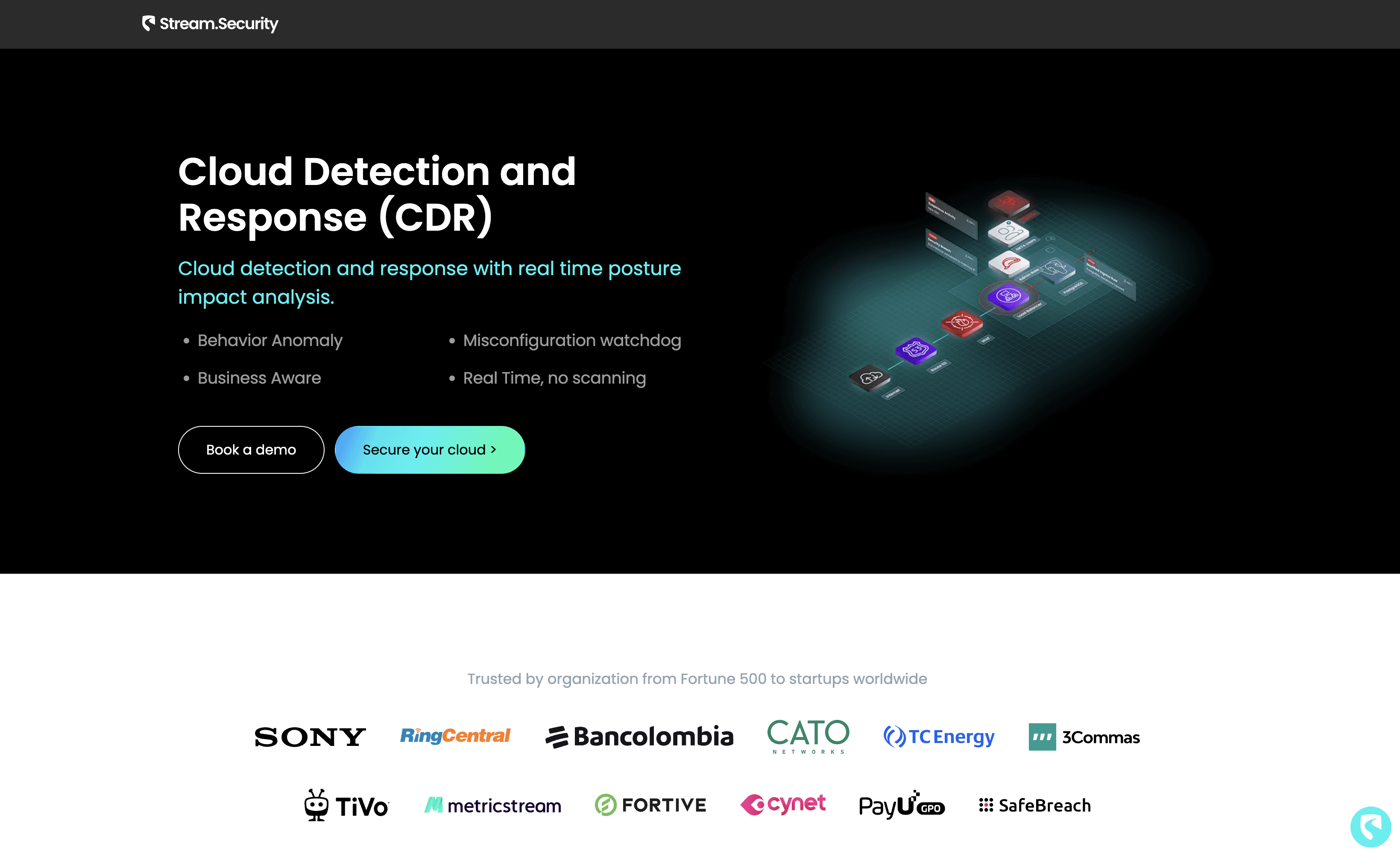
10 Alternatives to Stream Security
1. Splunk
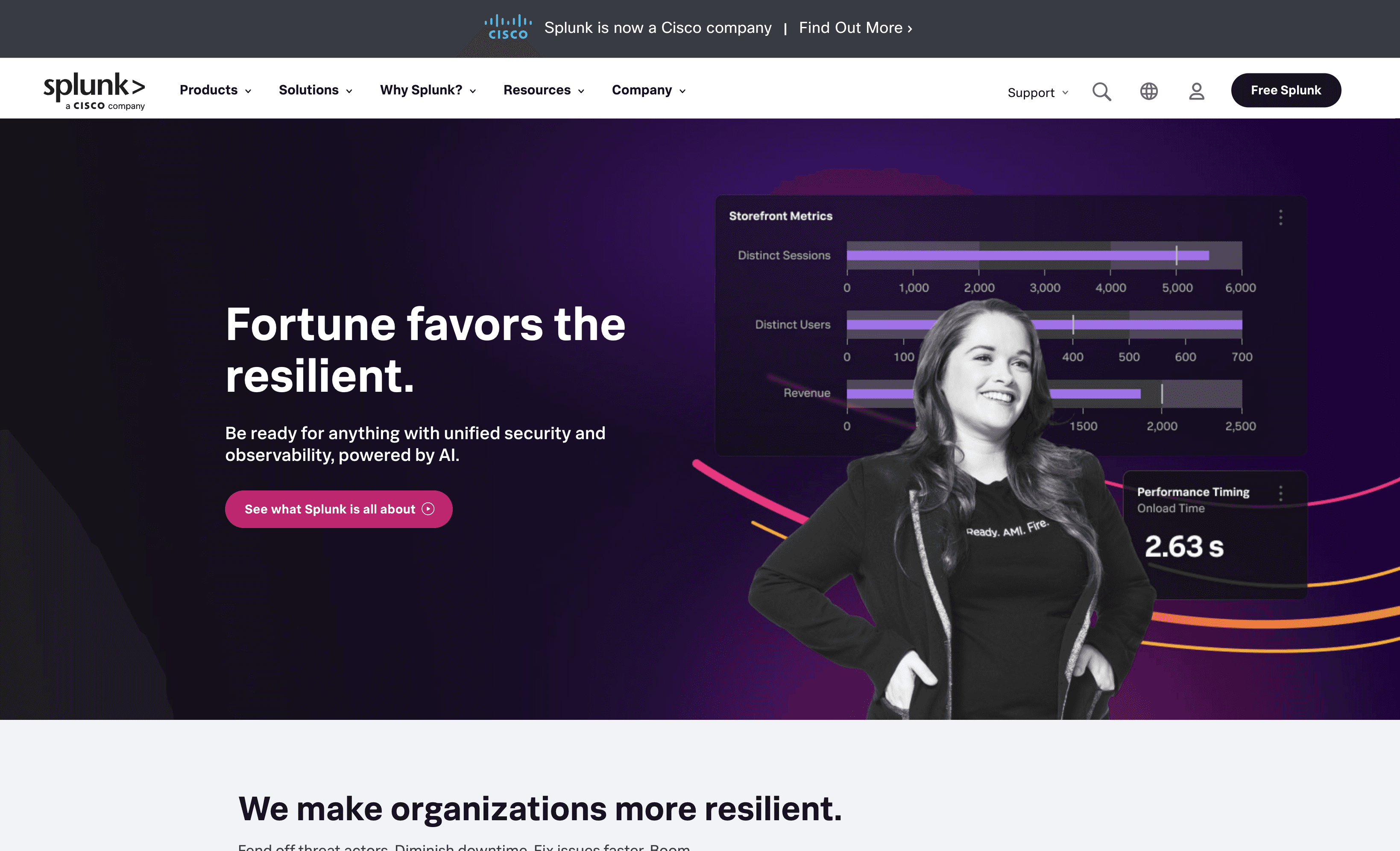
Splunk is a data platform designed to turn machine data into valuable insights. It offers real-time monitoring, advanced analytics, and automated response capabilities. With a focus on security and observability, Splunk helps organizations improve their operational efficiency and resilience.
Splunk Pricing
Workload Pricing
Ingest Pricing
Entity Pricing
Activity-based Pricing
Splunk's pricing is not public. Contact their support for more info.
Splunk Reviews
Splunk has an overall rating of 4.3 out of 5 stars based on 36 reviews. Users appreciate its ease of use and robust security features. Check out more of our reviews here!
Pros and Cons of Splunk
Pros:
Splunk's AI-powered solutions help detect and fix threats and downtime before they impact the business, ensuring operational continuity.
Rapid restoration of mission-critical services is possible, allowing businesses to bounce back quickly from disruptions.
Provides comprehensive visibility and insights, helping organizations stay secure, compliant, and reliable in dynamic environments.
Cons:
Some users find Splunk complex and time-consuming to manage, which can be a barrier for those without extensive technical expertise.
Splunk is often noted for being expensive, making it less accessible for smaller organizations with limited budgets.
The learning curve can be steep, requiring significant time and resources to fully leverage its capabilities.
2. UnderDefense
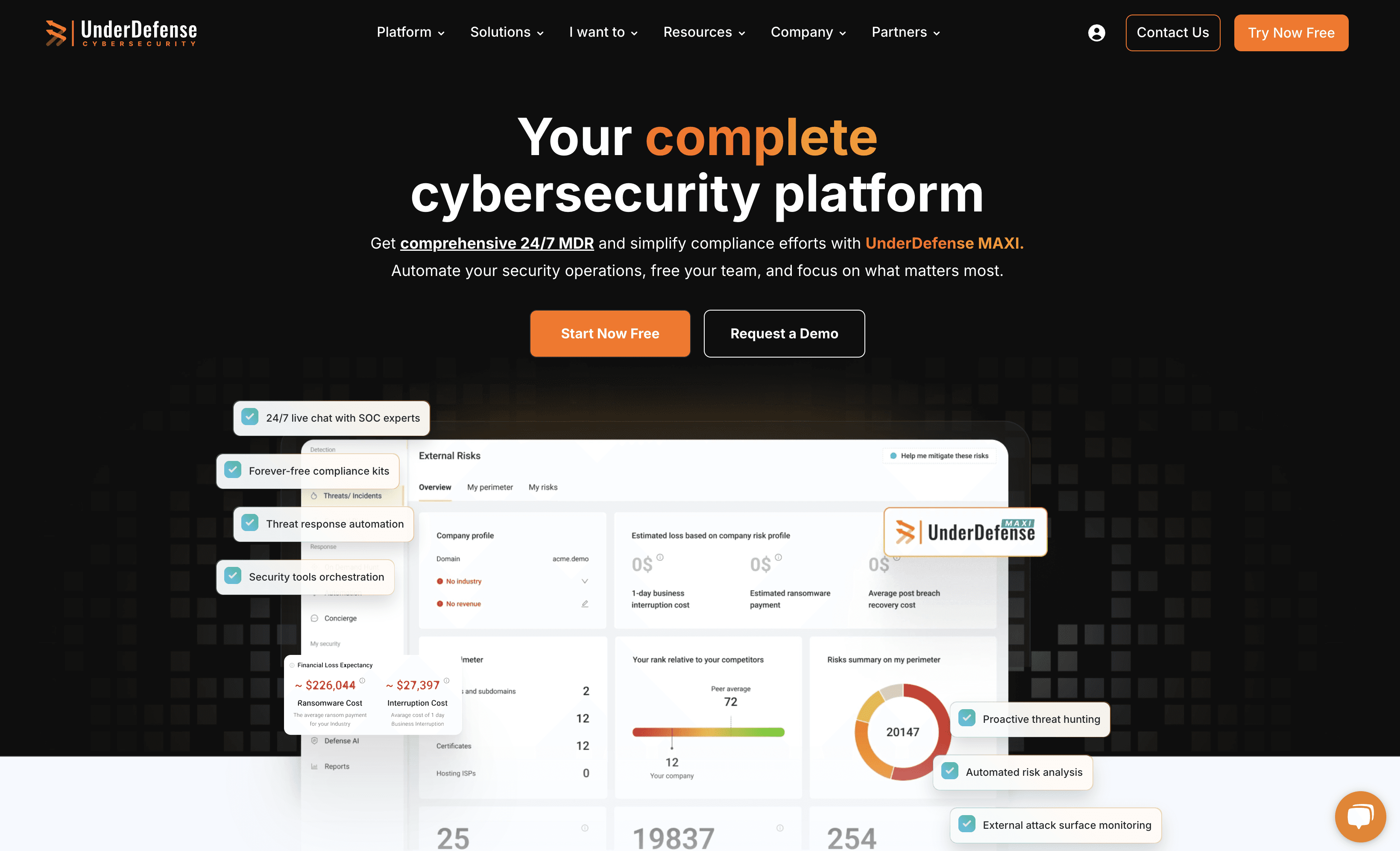
UnderDefense is a comprehensive cybersecurity platform offering 24/7 managed detection and response, threat response automation, and compliance tools. It integrates seamlessly with existing security tools, reducing false positives and alert fatigue. Designed for ease of use, it provides robust protection and visibility into your security posture.
UnderDefense Pricing
UnderDefense's pricing is not public. Contact their support for more info.
UnderDefense Reviews
UnderDefense has an overall rating of 5.0 out of 5 stars based on 4 reviews. Users praise the team's expertise and tailored approach to security testing. Check out more of our reviews here!
Pros and Cons ofUnderDefense
Pros:
24/7 live chat with SOC experts ensures immediate support and guidance, enhancing security response times.
Threat response automation reduces manual intervention, allowing for quicker and more efficient threat mitigation.
Seamless integration with existing security stacks minimizes disruption and leverages current investments.
Cons:
Some users find the recommendations in reports could be more specific, requiring additional effort to implement.
Updates during penetration tests are limited, leaving users wanting more frequent progress reports.
The platform's comprehensive features may be overwhelming for smaller organizations with limited resources.
3. Prisma Cloud
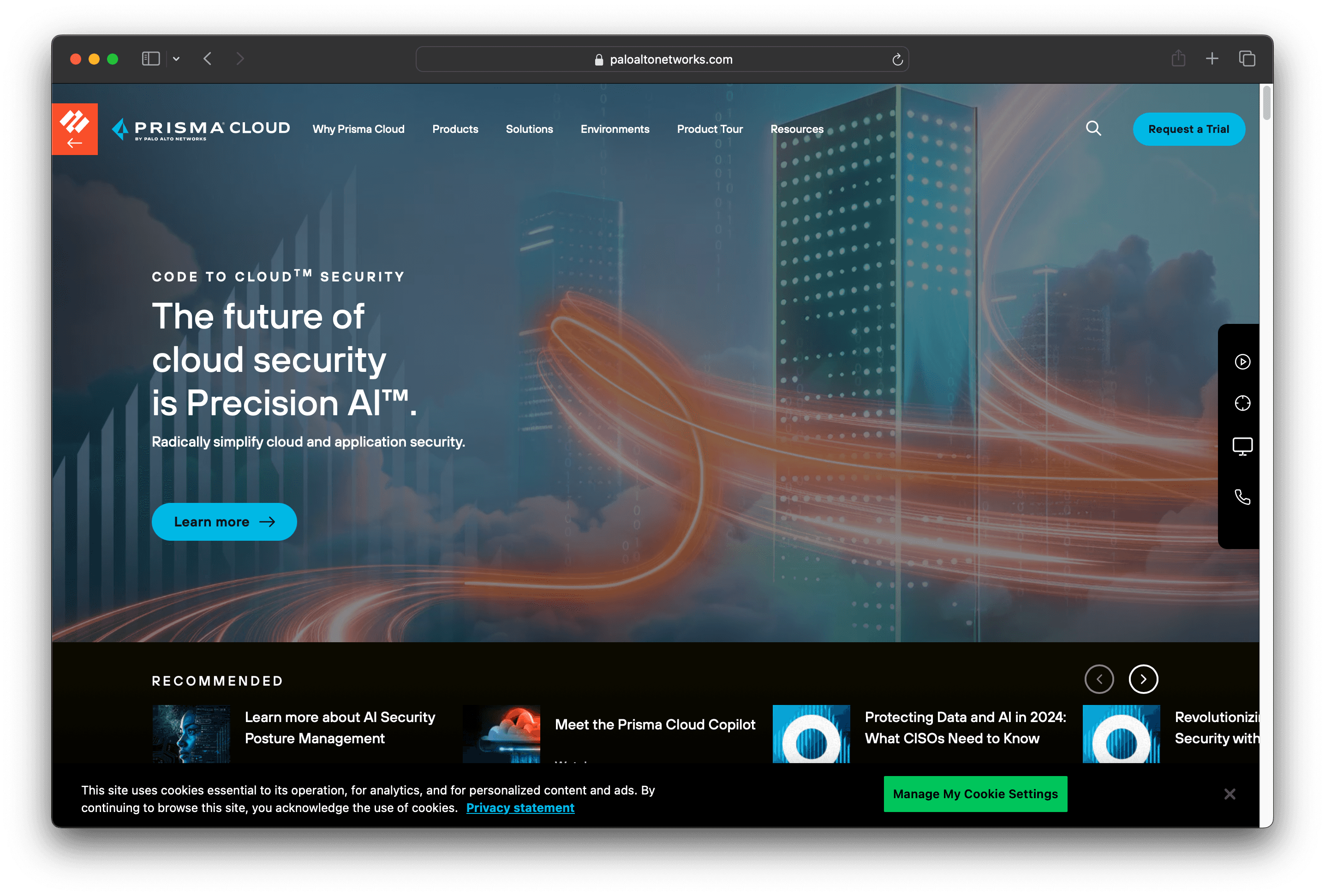
Prisma Cloud is a cloud security platform by Palo Alto Networks, designed to secure applications from code to cloud. It offers features like AI-powered risk insights, infrastructure protection, and runtime security, ensuring comprehensive protection throughout the application lifecycle. Ideal for organizations seeking robust cloud security solutions.
Prisma Cloud Pricing
Prisma Cloud's pricing is not public. Contact their support for more info.
Prisma Cloud Reviews
Prisma Cloud has an overall rating of 3.8 out of 5 stars based on 28 reviews. Users appreciate its comprehensive cloud security features. Check out more of our reviews here!
Pros and Cons of Prisma Cloud
Pros:
Comprehensive Security: Prisma Cloud secures every stage of the application lifecycle, from code to runtime, ensuring robust protection.
AI-Powered Insights: Utilizes AI to rapidly prioritize risks and provide actionable insights, enhancing security efficiency.
Customer Success: Proven success stories from leading organizations validate its effectiveness in real-world scenarios.
Cons:
Complexity: The platform's comprehensive nature might be overwhelming for smaller teams or organizations without dedicated security expertise.
Cost: Advanced security solutions like Prisma Cloud can be expensive, which might be a consideration for budget-conscious organizations.
Learning Curve: Implementing and fully utilizing all features of Prisma Cloud may require significant time and training.
4. CrowdStrike Falcon
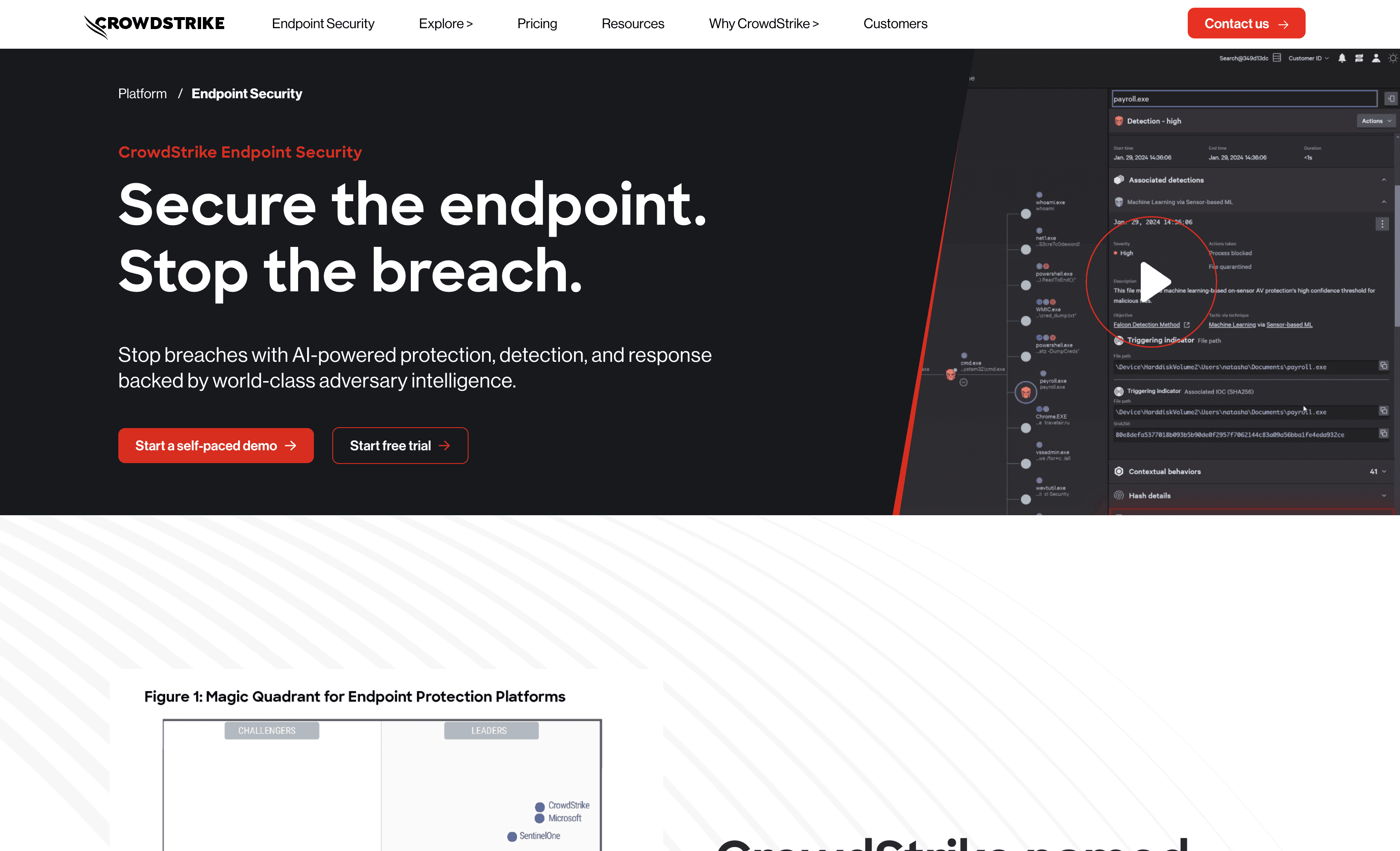
CrowdStrike Falcon is an endpoint security solution designed to protect against breaches with AI-powered detection and response capabilities. It offers comprehensive protection for various devices, ensuring robust security for businesses of all sizes. Easy to deploy and manage, Falcon aims to enhance cybersecurity with minimal complexity.
CrowdStrike Falcon Pricing
Falcon Pro: $99.99/device annually
Falcon Enterprise: $184.99/device annually
Falcon Go: $59.99/device annually
Falcon Elite: Contact sales for pricing
Falcon Complete MDR: Contact sales for pricing
CrowdStrike Falcon Reviews
CrowdStrike Falcon has an overall rating of 4.7 out of 5 stars based on 278 reviews. Users appreciate its advanced threat intelligence and ease of use. Check out more of our reviews here!
Pros and Cons of CrowdStrike Falcon
Pros:
AI-Powered Detection: Uses advanced AI to identify and block threats early, enhancing overall security.
Comprehensive Coverage: Protects all major operating systems, ensuring no device is left vulnerable.
Ease of Deployment: Quick and straightforward setup, allowing businesses to start protecting endpoints immediately.
Cons:
High Cost: Advanced features come at a premium, which may be prohibitive for smaller organizations.
Complexity: The platform's extensive capabilities can be overwhelming for users with limited IT expertise.
Learning Curve: Requires time and training to fully utilize all features, which can be a challenge for new users.
5. Lacework
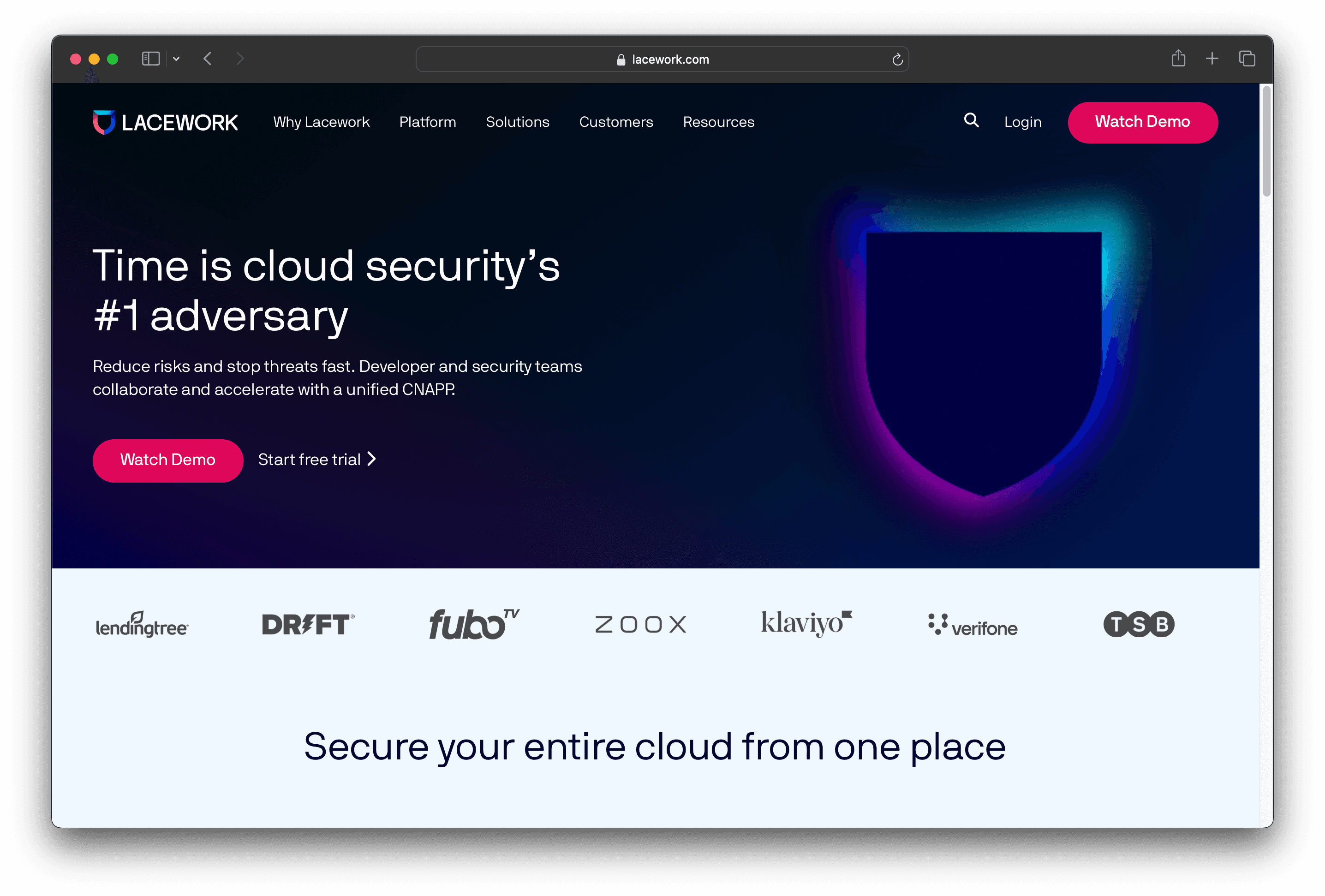
Lacework is a security platform designed for DevOps, containers, and cloud environments. It offers multi-cloud visibility and protection through an AI-driven platform, ensuring comprehensive security from code to cloud. Lacework aims to provide faster outcomes and better security for businesses of all sizes.
Lacework Pricing
Pro
Enterprise
Lacework's pricing is not public. Contact their support for more info.
Lacework Reviews
Lacework has an overall rating of 4.4 out of 5 stars based on 377 reviews. Users appreciate the detailed visibility and automation features. Check out more of our reviews here!
Pros and Cons of Lacework
Pros:
Unified Platform: Lacework offers a single platform to manage risks and threats across multiple cloud environments, simplifying security operations.
AI-Driven: Utilizes AI to provide unmatched multi-cloud visibility and protection, enhancing overall security posture.
Comprehensive Security: Covers various aspects of security, including code security, workload protection, and compliance, ensuring robust protection.
Cons:
Complexity: The platform's comprehensive nature might be overwhelming for smaller teams or those new to cloud security.
Integration Effort: Initial setup and integration with existing systems might require significant effort and resources.
Cost: Advanced features and AI-driven capabilities might come at a higher cost, which could be a barrier for startups or smaller enterprises.
6. Qualys
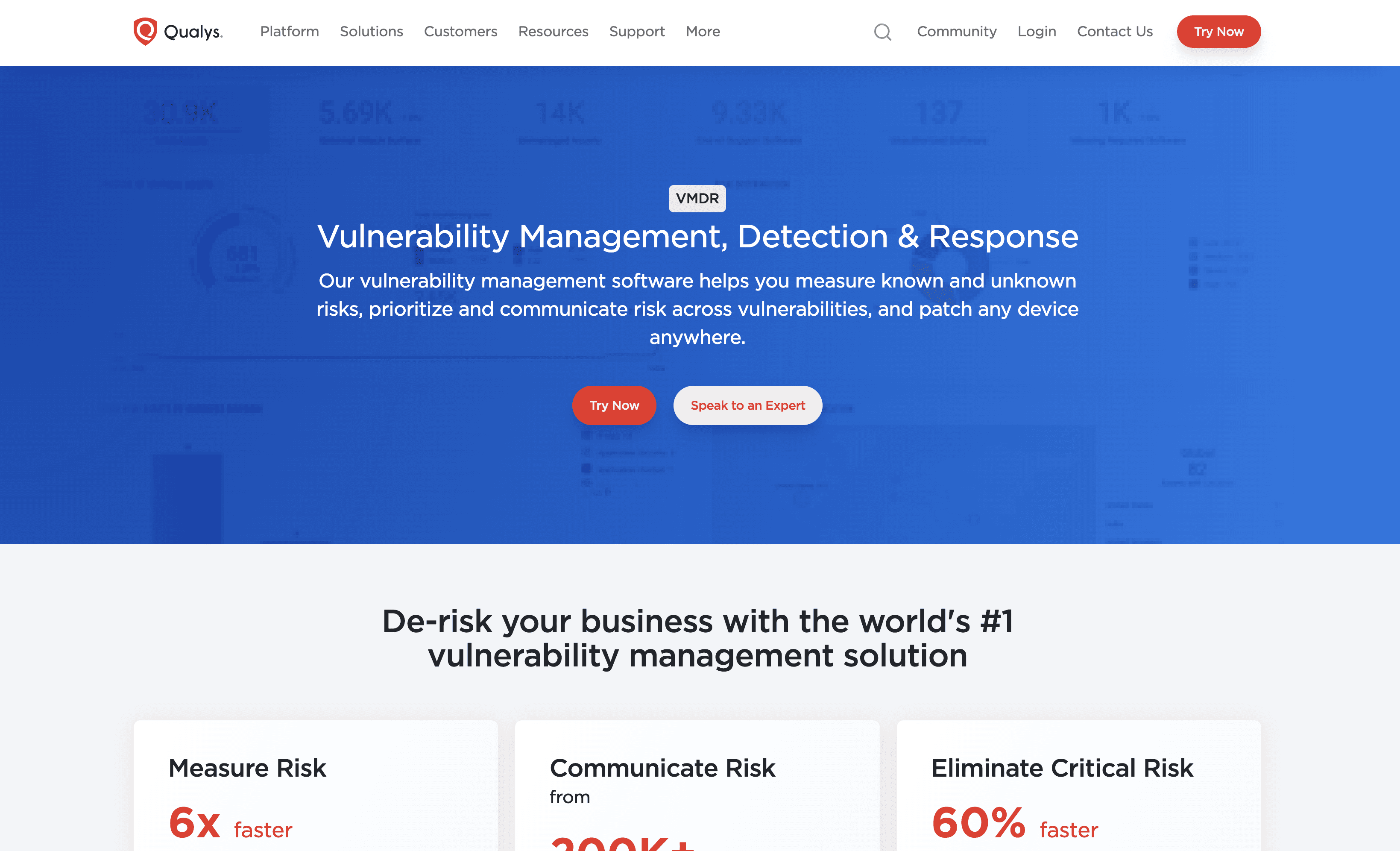
Qualys is a cybersecurity platform offering comprehensive vulnerability management, detection, and response. It aims to reduce cyber risk by discovering, assessing, and patching vulnerabilities in real-time. Designed for ease of use and efficiency, Qualys provides robust protection for businesses of all sizes.
Qualys Pricing
Qualys's pricing is not public. Contact their support for more info.
Qualys Reviews
Qualys has an overall rating of 4.1 out of 5 stars based on 21 reviews. Users appreciate its asset management and detailed reports. Check out more of our reviews here!
Pros and Cons of Qualys
Pros:
Qualys VMDR offers a comprehensive product suite, providing significant visibility into the IT environment and foundational security management.
The Asset Management function of VMDR provides significant visibility into the IT environment.
Accurate information about the findings is highly praised, ensuring reliable vulnerability detection.
Cons:
Licensing costs can build up, and licensing the entire product suite can become expensive for smaller organizations.
The web portal is described as clumsy and not intuitive, with no significant improvements made in recent years.
Some reviews mention the detection of false positive vulnerabilities, which can lead to unnecessary remediation efforts.
7. Tenable
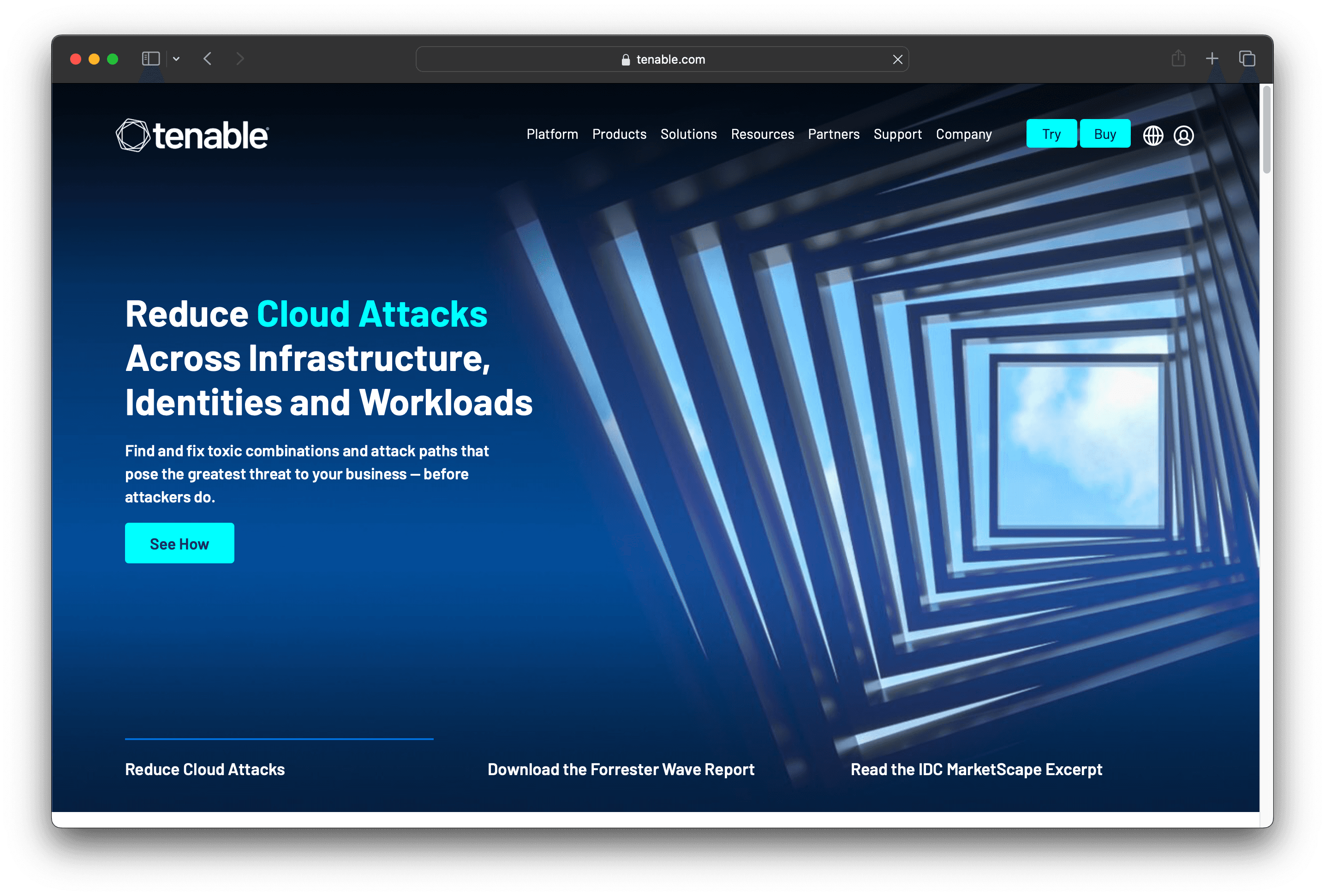
Tenable is a cybersecurity platform specializing in exposure management. It offers comprehensive solutions to identify, assess, and manage vulnerabilities across various environments. Designed for ease of use and scalability, Tenable aims to provide robust security for businesses of all sizes, ensuring a proactive approach to cyber threats.
Tenable Pricing
Tenable Nessus Professional (1 year): $3,990
Tenable Nessus Professional (2 years): $7,780.50
Tenable Nessus Professional (3 years): $11,371.50
Advanced support: $400
Nessus Fundamentals training: $275
Tenable Reviews
Tenable has an overall rating of 4.5 out of 5 stars based on 109 reviews. Users appreciate its intuitive interface and comprehensive asset discovery. Check out more of our reviews here!
Pros and Cons of Tenable
Pros:
Comprehensive Visibility: Tenable offers extensive visibility across IT, OT, and IoT environments, ensuring no asset is left unmonitored.
AI-Powered Analysis: Advanced AI capabilities enable rapid analysis and decision-making, enhancing overall security efficiency.
Risk-Based Prioritization: Tenable excels in prioritizing vulnerabilities based on business risk, ensuring critical issues are addressed first.
Cons:
High Cost: Comprehensive security coverage can be expensive, potentially limiting accessibility for smaller businesses.
Complex Setup: Initial setup and configuration can be complex, requiring specialized knowledge and resources.
Learning Curve: New users may face a steep learning curve to fully utilize Tenable's advanced features.
8. Illumio
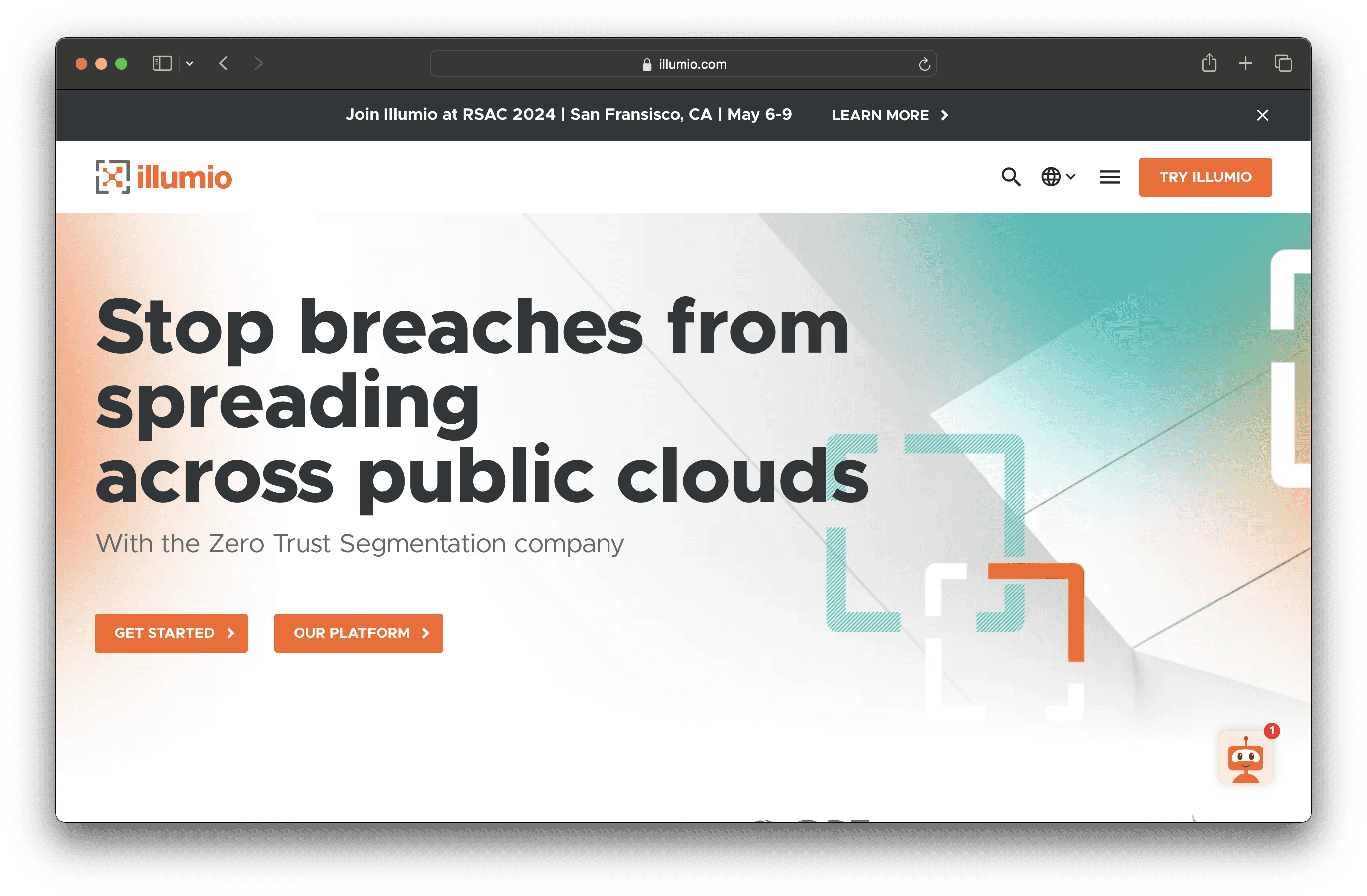
Illumio is a cybersecurity solution specializing in Zero Trust Segmentation. It aims to stop breaches and ransomware from spreading across hybrid environments. With a focus on ease of use and effective risk management, Illumio provides robust security for businesses of all sizes.
Illumio Pricing
Illumio's pricing is not public. Contact their support for more info.
Illumio Reviews
Illumio has an overall rating of 4.5 out of 5 stars based on 12 reviews. Users appreciate its database security and malware protection. Check out more of our reviews here!
Pros and Cons of Illumio
Pros:
Ease of Use: Illumio's interface is intuitive, making it accessible even for users with limited technical expertise.
Security: Provides robust protection against breaches and ransomware, ensuring a secure environment for all assets.
Threat Protection: Advanced threat detection and response capabilities help mitigate risks swiftly and effectively.
Cons:
Expensive: The cost of Illumio's advanced features can be prohibitive for smaller organizations with limited budgets.
Integration Issues: Some users report challenges when integrating Illumio with existing security systems.
Difficult Learning Curve: New users may find it challenging to fully utilize all features without significant training.
9. Silver Sky
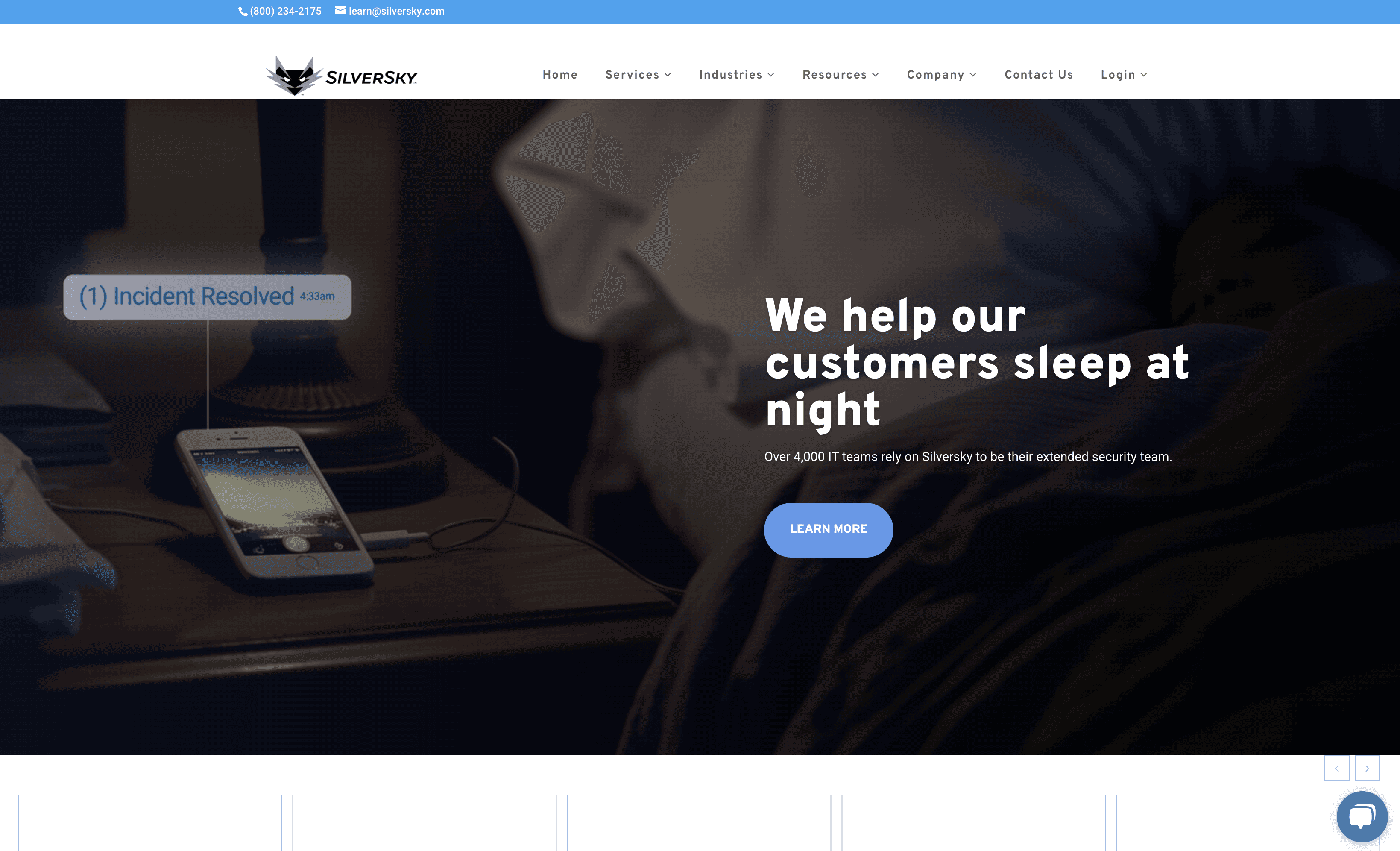
SilverSky is a cybersecurity platform offering managed detection and response services. It provides 24/7 security operations, automated threat response, and tailored playbooks. Designed for ease of use and compliance, SilverSky aims to deliver robust protection and support for businesses of all sizes.
Silver Sky Pricing
SilverSky's pricing is not public. Contact their support for more info.
Silver Sky Reviews
SilverSky has an overall rating of 4.6 out of 5 stars based on 4 reviews. Users appreciate its fast response times and effective intrusion alerts. Check out more of our reviews here!
Pros and Cons of Silver Sky
Pros:
Reliable and Knowledgeable Service: Users appreciate the reliability and expertise of the service, which continually keeps them safe.
Easy-to-Use Portal: The portal is user-friendly and offers detailed and thorough reports.
Fast Response Times: Intrusion alerts are descriptive, and response times are generally fast.
Cons:
Complexity for Small Businesses: The advanced and comprehensive nature of their services might be overwhelming for smaller businesses with limited IT resources.
Cost: High-quality, comprehensive cybersecurity services often come at a premium price, which might be a barrier for some organizations.
Dependence on Technology: Heavy reliance on automated systems and technology might pose a risk if there are system failures or cyber-attacks targeting their infrastructure.
10. Cyberark
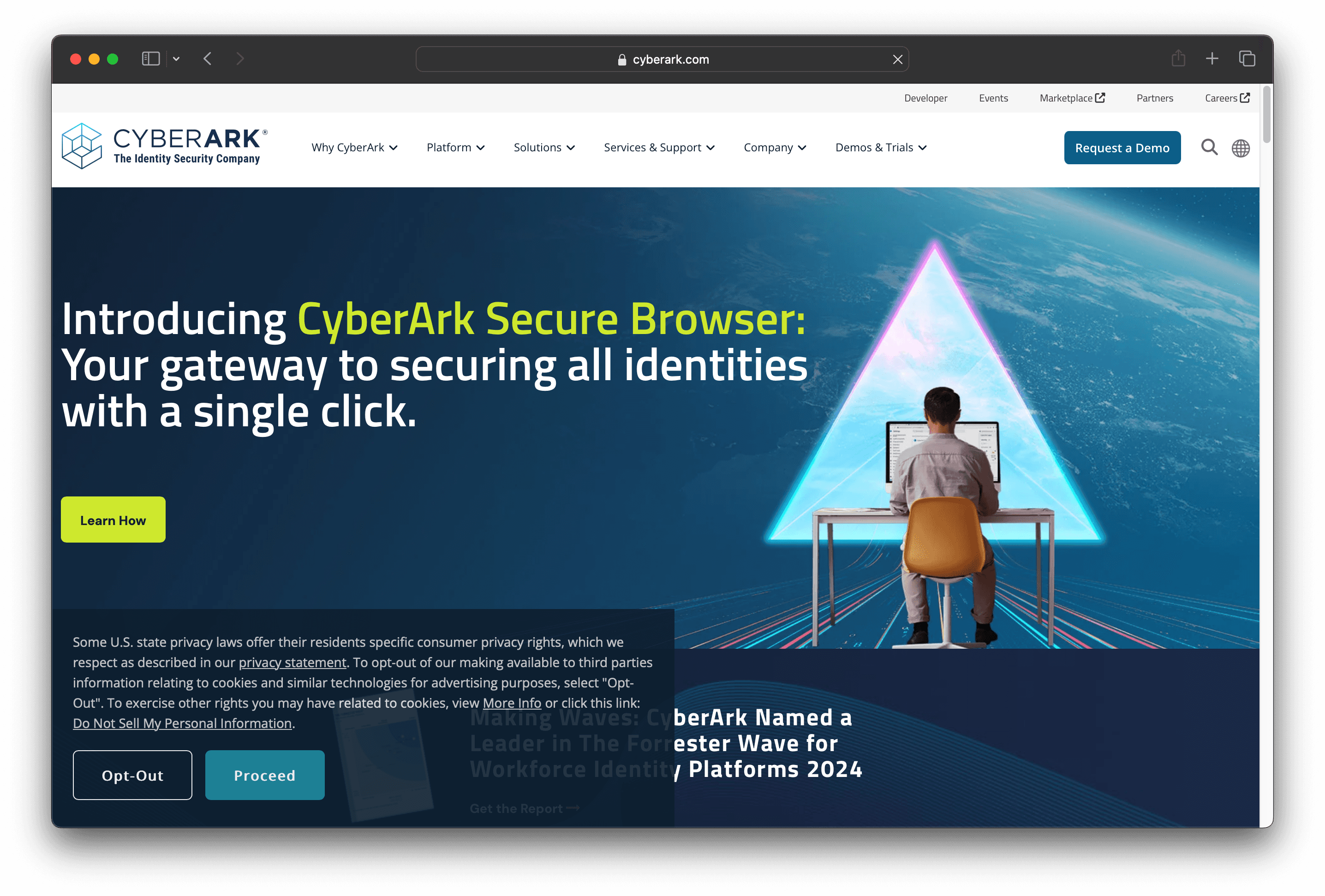
CyberArk is a cybersecurity solution focused on identity management and privileged access security. It automates and orchestrates the administration of digital identities, ensuring compliance and reducing manual processes. Designed for ease of use and scalability, CyberArk aims to provide robust security for businesses of all sizes.
Cyberark Pricing
Cyberark's pricing is not public. Contact their support for more info.
Cyberark Reviews
CyberArk has an overall rating of 4.4 out of 5 stars based on 107 reviews. Users appreciate its security features and user interface. Check out more of our reviews here!
Pros and Cons of Cyberark
Pros:
Automated Access Provisioning: Dynamically provision and revoke access to corporate resources, reducing manual effort and errors.
Identity Orchestration: Simplify and automate complex identity processes, enhancing operational efficiency and security.
Compliance Controls: Establish organization-wide compliance and access attestation controls, ensuring regulatory adherence.
Cons:
Complexity: Implementing and managing a comprehensive identity management system can be complex and resource-intensive.
Cost: Advanced identity management solutions can be expensive, especially for smaller organizations.
Integration: Integrating with existing systems and processes might require customization and additional effort.
Looking to secure your technical infrastructure?
Twingate offers granular access controls and deployment automations to protect your VPC environment. By leveraging Zero Trust security tools, Twingate ensures private resources and internet traffic remain secure in the modern world of work. Try Twingate for Free today!
Rapidly implement a modern Zero Trust network that is more secure and maintainable than VPNs.
The Best 10 Alternatives to Stream Security (+ Pricing & Reviews)
Twingate Team
•
Jul 27, 2024

Stream Security provides a Cloud Detection and Response (CDR) solution that offers real-time posture impact analysis, threat detection, and response capabilities to secure cloud environments. While it may not be the choice for everyone, it excels in real-time threat detection and cloud security. This article explores how Twingate enhances secure access for distributed workforces.

10 Alternatives to Stream Security
1. Splunk

Splunk is a data platform designed to turn machine data into valuable insights. It offers real-time monitoring, advanced analytics, and automated response capabilities. With a focus on security and observability, Splunk helps organizations improve their operational efficiency and resilience.
Splunk Pricing
Workload Pricing
Ingest Pricing
Entity Pricing
Activity-based Pricing
Splunk's pricing is not public. Contact their support for more info.
Splunk Reviews
Splunk has an overall rating of 4.3 out of 5 stars based on 36 reviews. Users appreciate its ease of use and robust security features. Check out more of our reviews here!
Pros and Cons of Splunk
Pros:
Splunk's AI-powered solutions help detect and fix threats and downtime before they impact the business, ensuring operational continuity.
Rapid restoration of mission-critical services is possible, allowing businesses to bounce back quickly from disruptions.
Provides comprehensive visibility and insights, helping organizations stay secure, compliant, and reliable in dynamic environments.
Cons:
Some users find Splunk complex and time-consuming to manage, which can be a barrier for those without extensive technical expertise.
Splunk is often noted for being expensive, making it less accessible for smaller organizations with limited budgets.
The learning curve can be steep, requiring significant time and resources to fully leverage its capabilities.
2. UnderDefense

UnderDefense is a comprehensive cybersecurity platform offering 24/7 managed detection and response, threat response automation, and compliance tools. It integrates seamlessly with existing security tools, reducing false positives and alert fatigue. Designed for ease of use, it provides robust protection and visibility into your security posture.
UnderDefense Pricing
UnderDefense's pricing is not public. Contact their support for more info.
UnderDefense Reviews
UnderDefense has an overall rating of 5.0 out of 5 stars based on 4 reviews. Users praise the team's expertise and tailored approach to security testing. Check out more of our reviews here!
Pros and Cons ofUnderDefense
Pros:
24/7 live chat with SOC experts ensures immediate support and guidance, enhancing security response times.
Threat response automation reduces manual intervention, allowing for quicker and more efficient threat mitigation.
Seamless integration with existing security stacks minimizes disruption and leverages current investments.
Cons:
Some users find the recommendations in reports could be more specific, requiring additional effort to implement.
Updates during penetration tests are limited, leaving users wanting more frequent progress reports.
The platform's comprehensive features may be overwhelming for smaller organizations with limited resources.
3. Prisma Cloud

Prisma Cloud is a cloud security platform by Palo Alto Networks, designed to secure applications from code to cloud. It offers features like AI-powered risk insights, infrastructure protection, and runtime security, ensuring comprehensive protection throughout the application lifecycle. Ideal for organizations seeking robust cloud security solutions.
Prisma Cloud Pricing
Prisma Cloud's pricing is not public. Contact their support for more info.
Prisma Cloud Reviews
Prisma Cloud has an overall rating of 3.8 out of 5 stars based on 28 reviews. Users appreciate its comprehensive cloud security features. Check out more of our reviews here!
Pros and Cons of Prisma Cloud
Pros:
Comprehensive Security: Prisma Cloud secures every stage of the application lifecycle, from code to runtime, ensuring robust protection.
AI-Powered Insights: Utilizes AI to rapidly prioritize risks and provide actionable insights, enhancing security efficiency.
Customer Success: Proven success stories from leading organizations validate its effectiveness in real-world scenarios.
Cons:
Complexity: The platform's comprehensive nature might be overwhelming for smaller teams or organizations without dedicated security expertise.
Cost: Advanced security solutions like Prisma Cloud can be expensive, which might be a consideration for budget-conscious organizations.
Learning Curve: Implementing and fully utilizing all features of Prisma Cloud may require significant time and training.
4. CrowdStrike Falcon

CrowdStrike Falcon is an endpoint security solution designed to protect against breaches with AI-powered detection and response capabilities. It offers comprehensive protection for various devices, ensuring robust security for businesses of all sizes. Easy to deploy and manage, Falcon aims to enhance cybersecurity with minimal complexity.
CrowdStrike Falcon Pricing
Falcon Pro: $99.99/device annually
Falcon Enterprise: $184.99/device annually
Falcon Go: $59.99/device annually
Falcon Elite: Contact sales for pricing
Falcon Complete MDR: Contact sales for pricing
CrowdStrike Falcon Reviews
CrowdStrike Falcon has an overall rating of 4.7 out of 5 stars based on 278 reviews. Users appreciate its advanced threat intelligence and ease of use. Check out more of our reviews here!
Pros and Cons of CrowdStrike Falcon
Pros:
AI-Powered Detection: Uses advanced AI to identify and block threats early, enhancing overall security.
Comprehensive Coverage: Protects all major operating systems, ensuring no device is left vulnerable.
Ease of Deployment: Quick and straightforward setup, allowing businesses to start protecting endpoints immediately.
Cons:
High Cost: Advanced features come at a premium, which may be prohibitive for smaller organizations.
Complexity: The platform's extensive capabilities can be overwhelming for users with limited IT expertise.
Learning Curve: Requires time and training to fully utilize all features, which can be a challenge for new users.
5. Lacework

Lacework is a security platform designed for DevOps, containers, and cloud environments. It offers multi-cloud visibility and protection through an AI-driven platform, ensuring comprehensive security from code to cloud. Lacework aims to provide faster outcomes and better security for businesses of all sizes.
Lacework Pricing
Pro
Enterprise
Lacework's pricing is not public. Contact their support for more info.
Lacework Reviews
Lacework has an overall rating of 4.4 out of 5 stars based on 377 reviews. Users appreciate the detailed visibility and automation features. Check out more of our reviews here!
Pros and Cons of Lacework
Pros:
Unified Platform: Lacework offers a single platform to manage risks and threats across multiple cloud environments, simplifying security operations.
AI-Driven: Utilizes AI to provide unmatched multi-cloud visibility and protection, enhancing overall security posture.
Comprehensive Security: Covers various aspects of security, including code security, workload protection, and compliance, ensuring robust protection.
Cons:
Complexity: The platform's comprehensive nature might be overwhelming for smaller teams or those new to cloud security.
Integration Effort: Initial setup and integration with existing systems might require significant effort and resources.
Cost: Advanced features and AI-driven capabilities might come at a higher cost, which could be a barrier for startups or smaller enterprises.
6. Qualys

Qualys is a cybersecurity platform offering comprehensive vulnerability management, detection, and response. It aims to reduce cyber risk by discovering, assessing, and patching vulnerabilities in real-time. Designed for ease of use and efficiency, Qualys provides robust protection for businesses of all sizes.
Qualys Pricing
Qualys's pricing is not public. Contact their support for more info.
Qualys Reviews
Qualys has an overall rating of 4.1 out of 5 stars based on 21 reviews. Users appreciate its asset management and detailed reports. Check out more of our reviews here!
Pros and Cons of Qualys
Pros:
Qualys VMDR offers a comprehensive product suite, providing significant visibility into the IT environment and foundational security management.
The Asset Management function of VMDR provides significant visibility into the IT environment.
Accurate information about the findings is highly praised, ensuring reliable vulnerability detection.
Cons:
Licensing costs can build up, and licensing the entire product suite can become expensive for smaller organizations.
The web portal is described as clumsy and not intuitive, with no significant improvements made in recent years.
Some reviews mention the detection of false positive vulnerabilities, which can lead to unnecessary remediation efforts.
7. Tenable

Tenable is a cybersecurity platform specializing in exposure management. It offers comprehensive solutions to identify, assess, and manage vulnerabilities across various environments. Designed for ease of use and scalability, Tenable aims to provide robust security for businesses of all sizes, ensuring a proactive approach to cyber threats.
Tenable Pricing
Tenable Nessus Professional (1 year): $3,990
Tenable Nessus Professional (2 years): $7,780.50
Tenable Nessus Professional (3 years): $11,371.50
Advanced support: $400
Nessus Fundamentals training: $275
Tenable Reviews
Tenable has an overall rating of 4.5 out of 5 stars based on 109 reviews. Users appreciate its intuitive interface and comprehensive asset discovery. Check out more of our reviews here!
Pros and Cons of Tenable
Pros:
Comprehensive Visibility: Tenable offers extensive visibility across IT, OT, and IoT environments, ensuring no asset is left unmonitored.
AI-Powered Analysis: Advanced AI capabilities enable rapid analysis and decision-making, enhancing overall security efficiency.
Risk-Based Prioritization: Tenable excels in prioritizing vulnerabilities based on business risk, ensuring critical issues are addressed first.
Cons:
High Cost: Comprehensive security coverage can be expensive, potentially limiting accessibility for smaller businesses.
Complex Setup: Initial setup and configuration can be complex, requiring specialized knowledge and resources.
Learning Curve: New users may face a steep learning curve to fully utilize Tenable's advanced features.
8. Illumio

Illumio is a cybersecurity solution specializing in Zero Trust Segmentation. It aims to stop breaches and ransomware from spreading across hybrid environments. With a focus on ease of use and effective risk management, Illumio provides robust security for businesses of all sizes.
Illumio Pricing
Illumio's pricing is not public. Contact their support for more info.
Illumio Reviews
Illumio has an overall rating of 4.5 out of 5 stars based on 12 reviews. Users appreciate its database security and malware protection. Check out more of our reviews here!
Pros and Cons of Illumio
Pros:
Ease of Use: Illumio's interface is intuitive, making it accessible even for users with limited technical expertise.
Security: Provides robust protection against breaches and ransomware, ensuring a secure environment for all assets.
Threat Protection: Advanced threat detection and response capabilities help mitigate risks swiftly and effectively.
Cons:
Expensive: The cost of Illumio's advanced features can be prohibitive for smaller organizations with limited budgets.
Integration Issues: Some users report challenges when integrating Illumio with existing security systems.
Difficult Learning Curve: New users may find it challenging to fully utilize all features without significant training.
9. Silver Sky

SilverSky is a cybersecurity platform offering managed detection and response services. It provides 24/7 security operations, automated threat response, and tailored playbooks. Designed for ease of use and compliance, SilverSky aims to deliver robust protection and support for businesses of all sizes.
Silver Sky Pricing
SilverSky's pricing is not public. Contact their support for more info.
Silver Sky Reviews
SilverSky has an overall rating of 4.6 out of 5 stars based on 4 reviews. Users appreciate its fast response times and effective intrusion alerts. Check out more of our reviews here!
Pros and Cons of Silver Sky
Pros:
Reliable and Knowledgeable Service: Users appreciate the reliability and expertise of the service, which continually keeps them safe.
Easy-to-Use Portal: The portal is user-friendly and offers detailed and thorough reports.
Fast Response Times: Intrusion alerts are descriptive, and response times are generally fast.
Cons:
Complexity for Small Businesses: The advanced and comprehensive nature of their services might be overwhelming for smaller businesses with limited IT resources.
Cost: High-quality, comprehensive cybersecurity services often come at a premium price, which might be a barrier for some organizations.
Dependence on Technology: Heavy reliance on automated systems and technology might pose a risk if there are system failures or cyber-attacks targeting their infrastructure.
10. Cyberark

CyberArk is a cybersecurity solution focused on identity management and privileged access security. It automates and orchestrates the administration of digital identities, ensuring compliance and reducing manual processes. Designed for ease of use and scalability, CyberArk aims to provide robust security for businesses of all sizes.
Cyberark Pricing
Cyberark's pricing is not public. Contact their support for more info.
Cyberark Reviews
CyberArk has an overall rating of 4.4 out of 5 stars based on 107 reviews. Users appreciate its security features and user interface. Check out more of our reviews here!
Pros and Cons of Cyberark
Pros:
Automated Access Provisioning: Dynamically provision and revoke access to corporate resources, reducing manual effort and errors.
Identity Orchestration: Simplify and automate complex identity processes, enhancing operational efficiency and security.
Compliance Controls: Establish organization-wide compliance and access attestation controls, ensuring regulatory adherence.
Cons:
Complexity: Implementing and managing a comprehensive identity management system can be complex and resource-intensive.
Cost: Advanced identity management solutions can be expensive, especially for smaller organizations.
Integration: Integrating with existing systems and processes might require customization and additional effort.
Looking to secure your technical infrastructure?
Twingate offers granular access controls and deployment automations to protect your VPC environment. By leveraging Zero Trust security tools, Twingate ensures private resources and internet traffic remain secure in the modern world of work. Try Twingate for Free today!
Rapidly implement a modern Zero Trust network that is more secure and maintainable than VPNs.
The Best 10 Alternatives to Stream Security (+ Pricing & Reviews)
Twingate Team
•
Jul 27, 2024

Stream Security provides a Cloud Detection and Response (CDR) solution that offers real-time posture impact analysis, threat detection, and response capabilities to secure cloud environments. While it may not be the choice for everyone, it excels in real-time threat detection and cloud security. This article explores how Twingate enhances secure access for distributed workforces.

10 Alternatives to Stream Security
1. Splunk

Splunk is a data platform designed to turn machine data into valuable insights. It offers real-time monitoring, advanced analytics, and automated response capabilities. With a focus on security and observability, Splunk helps organizations improve their operational efficiency and resilience.
Splunk Pricing
Workload Pricing
Ingest Pricing
Entity Pricing
Activity-based Pricing
Splunk's pricing is not public. Contact their support for more info.
Splunk Reviews
Splunk has an overall rating of 4.3 out of 5 stars based on 36 reviews. Users appreciate its ease of use and robust security features. Check out more of our reviews here!
Pros and Cons of Splunk
Pros:
Splunk's AI-powered solutions help detect and fix threats and downtime before they impact the business, ensuring operational continuity.
Rapid restoration of mission-critical services is possible, allowing businesses to bounce back quickly from disruptions.
Provides comprehensive visibility and insights, helping organizations stay secure, compliant, and reliable in dynamic environments.
Cons:
Some users find Splunk complex and time-consuming to manage, which can be a barrier for those without extensive technical expertise.
Splunk is often noted for being expensive, making it less accessible for smaller organizations with limited budgets.
The learning curve can be steep, requiring significant time and resources to fully leverage its capabilities.
2. UnderDefense

UnderDefense is a comprehensive cybersecurity platform offering 24/7 managed detection and response, threat response automation, and compliance tools. It integrates seamlessly with existing security tools, reducing false positives and alert fatigue. Designed for ease of use, it provides robust protection and visibility into your security posture.
UnderDefense Pricing
UnderDefense's pricing is not public. Contact their support for more info.
UnderDefense Reviews
UnderDefense has an overall rating of 5.0 out of 5 stars based on 4 reviews. Users praise the team's expertise and tailored approach to security testing. Check out more of our reviews here!
Pros and Cons ofUnderDefense
Pros:
24/7 live chat with SOC experts ensures immediate support and guidance, enhancing security response times.
Threat response automation reduces manual intervention, allowing for quicker and more efficient threat mitigation.
Seamless integration with existing security stacks minimizes disruption and leverages current investments.
Cons:
Some users find the recommendations in reports could be more specific, requiring additional effort to implement.
Updates during penetration tests are limited, leaving users wanting more frequent progress reports.
The platform's comprehensive features may be overwhelming for smaller organizations with limited resources.
3. Prisma Cloud

Prisma Cloud is a cloud security platform by Palo Alto Networks, designed to secure applications from code to cloud. It offers features like AI-powered risk insights, infrastructure protection, and runtime security, ensuring comprehensive protection throughout the application lifecycle. Ideal for organizations seeking robust cloud security solutions.
Prisma Cloud Pricing
Prisma Cloud's pricing is not public. Contact their support for more info.
Prisma Cloud Reviews
Prisma Cloud has an overall rating of 3.8 out of 5 stars based on 28 reviews. Users appreciate its comprehensive cloud security features. Check out more of our reviews here!
Pros and Cons of Prisma Cloud
Pros:
Comprehensive Security: Prisma Cloud secures every stage of the application lifecycle, from code to runtime, ensuring robust protection.
AI-Powered Insights: Utilizes AI to rapidly prioritize risks and provide actionable insights, enhancing security efficiency.
Customer Success: Proven success stories from leading organizations validate its effectiveness in real-world scenarios.
Cons:
Complexity: The platform's comprehensive nature might be overwhelming for smaller teams or organizations without dedicated security expertise.
Cost: Advanced security solutions like Prisma Cloud can be expensive, which might be a consideration for budget-conscious organizations.
Learning Curve: Implementing and fully utilizing all features of Prisma Cloud may require significant time and training.
4. CrowdStrike Falcon

CrowdStrike Falcon is an endpoint security solution designed to protect against breaches with AI-powered detection and response capabilities. It offers comprehensive protection for various devices, ensuring robust security for businesses of all sizes. Easy to deploy and manage, Falcon aims to enhance cybersecurity with minimal complexity.
CrowdStrike Falcon Pricing
Falcon Pro: $99.99/device annually
Falcon Enterprise: $184.99/device annually
Falcon Go: $59.99/device annually
Falcon Elite: Contact sales for pricing
Falcon Complete MDR: Contact sales for pricing
CrowdStrike Falcon Reviews
CrowdStrike Falcon has an overall rating of 4.7 out of 5 stars based on 278 reviews. Users appreciate its advanced threat intelligence and ease of use. Check out more of our reviews here!
Pros and Cons of CrowdStrike Falcon
Pros:
AI-Powered Detection: Uses advanced AI to identify and block threats early, enhancing overall security.
Comprehensive Coverage: Protects all major operating systems, ensuring no device is left vulnerable.
Ease of Deployment: Quick and straightforward setup, allowing businesses to start protecting endpoints immediately.
Cons:
High Cost: Advanced features come at a premium, which may be prohibitive for smaller organizations.
Complexity: The platform's extensive capabilities can be overwhelming for users with limited IT expertise.
Learning Curve: Requires time and training to fully utilize all features, which can be a challenge for new users.
5. Lacework

Lacework is a security platform designed for DevOps, containers, and cloud environments. It offers multi-cloud visibility and protection through an AI-driven platform, ensuring comprehensive security from code to cloud. Lacework aims to provide faster outcomes and better security for businesses of all sizes.
Lacework Pricing
Pro
Enterprise
Lacework's pricing is not public. Contact their support for more info.
Lacework Reviews
Lacework has an overall rating of 4.4 out of 5 stars based on 377 reviews. Users appreciate the detailed visibility and automation features. Check out more of our reviews here!
Pros and Cons of Lacework
Pros:
Unified Platform: Lacework offers a single platform to manage risks and threats across multiple cloud environments, simplifying security operations.
AI-Driven: Utilizes AI to provide unmatched multi-cloud visibility and protection, enhancing overall security posture.
Comprehensive Security: Covers various aspects of security, including code security, workload protection, and compliance, ensuring robust protection.
Cons:
Complexity: The platform's comprehensive nature might be overwhelming for smaller teams or those new to cloud security.
Integration Effort: Initial setup and integration with existing systems might require significant effort and resources.
Cost: Advanced features and AI-driven capabilities might come at a higher cost, which could be a barrier for startups or smaller enterprises.
6. Qualys

Qualys is a cybersecurity platform offering comprehensive vulnerability management, detection, and response. It aims to reduce cyber risk by discovering, assessing, and patching vulnerabilities in real-time. Designed for ease of use and efficiency, Qualys provides robust protection for businesses of all sizes.
Qualys Pricing
Qualys's pricing is not public. Contact their support for more info.
Qualys Reviews
Qualys has an overall rating of 4.1 out of 5 stars based on 21 reviews. Users appreciate its asset management and detailed reports. Check out more of our reviews here!
Pros and Cons of Qualys
Pros:
Qualys VMDR offers a comprehensive product suite, providing significant visibility into the IT environment and foundational security management.
The Asset Management function of VMDR provides significant visibility into the IT environment.
Accurate information about the findings is highly praised, ensuring reliable vulnerability detection.
Cons:
Licensing costs can build up, and licensing the entire product suite can become expensive for smaller organizations.
The web portal is described as clumsy and not intuitive, with no significant improvements made in recent years.
Some reviews mention the detection of false positive vulnerabilities, which can lead to unnecessary remediation efforts.
7. Tenable

Tenable is a cybersecurity platform specializing in exposure management. It offers comprehensive solutions to identify, assess, and manage vulnerabilities across various environments. Designed for ease of use and scalability, Tenable aims to provide robust security for businesses of all sizes, ensuring a proactive approach to cyber threats.
Tenable Pricing
Tenable Nessus Professional (1 year): $3,990
Tenable Nessus Professional (2 years): $7,780.50
Tenable Nessus Professional (3 years): $11,371.50
Advanced support: $400
Nessus Fundamentals training: $275
Tenable Reviews
Tenable has an overall rating of 4.5 out of 5 stars based on 109 reviews. Users appreciate its intuitive interface and comprehensive asset discovery. Check out more of our reviews here!
Pros and Cons of Tenable
Pros:
Comprehensive Visibility: Tenable offers extensive visibility across IT, OT, and IoT environments, ensuring no asset is left unmonitored.
AI-Powered Analysis: Advanced AI capabilities enable rapid analysis and decision-making, enhancing overall security efficiency.
Risk-Based Prioritization: Tenable excels in prioritizing vulnerabilities based on business risk, ensuring critical issues are addressed first.
Cons:
High Cost: Comprehensive security coverage can be expensive, potentially limiting accessibility for smaller businesses.
Complex Setup: Initial setup and configuration can be complex, requiring specialized knowledge and resources.
Learning Curve: New users may face a steep learning curve to fully utilize Tenable's advanced features.
8. Illumio

Illumio is a cybersecurity solution specializing in Zero Trust Segmentation. It aims to stop breaches and ransomware from spreading across hybrid environments. With a focus on ease of use and effective risk management, Illumio provides robust security for businesses of all sizes.
Illumio Pricing
Illumio's pricing is not public. Contact their support for more info.
Illumio Reviews
Illumio has an overall rating of 4.5 out of 5 stars based on 12 reviews. Users appreciate its database security and malware protection. Check out more of our reviews here!
Pros and Cons of Illumio
Pros:
Ease of Use: Illumio's interface is intuitive, making it accessible even for users with limited technical expertise.
Security: Provides robust protection against breaches and ransomware, ensuring a secure environment for all assets.
Threat Protection: Advanced threat detection and response capabilities help mitigate risks swiftly and effectively.
Cons:
Expensive: The cost of Illumio's advanced features can be prohibitive for smaller organizations with limited budgets.
Integration Issues: Some users report challenges when integrating Illumio with existing security systems.
Difficult Learning Curve: New users may find it challenging to fully utilize all features without significant training.
9. Silver Sky

SilverSky is a cybersecurity platform offering managed detection and response services. It provides 24/7 security operations, automated threat response, and tailored playbooks. Designed for ease of use and compliance, SilverSky aims to deliver robust protection and support for businesses of all sizes.
Silver Sky Pricing
SilverSky's pricing is not public. Contact their support for more info.
Silver Sky Reviews
SilverSky has an overall rating of 4.6 out of 5 stars based on 4 reviews. Users appreciate its fast response times and effective intrusion alerts. Check out more of our reviews here!
Pros and Cons of Silver Sky
Pros:
Reliable and Knowledgeable Service: Users appreciate the reliability and expertise of the service, which continually keeps them safe.
Easy-to-Use Portal: The portal is user-friendly and offers detailed and thorough reports.
Fast Response Times: Intrusion alerts are descriptive, and response times are generally fast.
Cons:
Complexity for Small Businesses: The advanced and comprehensive nature of their services might be overwhelming for smaller businesses with limited IT resources.
Cost: High-quality, comprehensive cybersecurity services often come at a premium price, which might be a barrier for some organizations.
Dependence on Technology: Heavy reliance on automated systems and technology might pose a risk if there are system failures or cyber-attacks targeting their infrastructure.
10. Cyberark

CyberArk is a cybersecurity solution focused on identity management and privileged access security. It automates and orchestrates the administration of digital identities, ensuring compliance and reducing manual processes. Designed for ease of use and scalability, CyberArk aims to provide robust security for businesses of all sizes.
Cyberark Pricing
Cyberark's pricing is not public. Contact their support for more info.
Cyberark Reviews
CyberArk has an overall rating of 4.4 out of 5 stars based on 107 reviews. Users appreciate its security features and user interface. Check out more of our reviews here!
Pros and Cons of Cyberark
Pros:
Automated Access Provisioning: Dynamically provision and revoke access to corporate resources, reducing manual effort and errors.
Identity Orchestration: Simplify and automate complex identity processes, enhancing operational efficiency and security.
Compliance Controls: Establish organization-wide compliance and access attestation controls, ensuring regulatory adherence.
Cons:
Complexity: Implementing and managing a comprehensive identity management system can be complex and resource-intensive.
Cost: Advanced identity management solutions can be expensive, especially for smaller organizations.
Integration: Integrating with existing systems and processes might require customization and additional effort.
Looking to secure your technical infrastructure?
Twingate offers granular access controls and deployment automations to protect your VPC environment. By leveraging Zero Trust security tools, Twingate ensures private resources and internet traffic remain secure in the modern world of work. Try Twingate for Free today!
Solutions
Solutions
The VPN replacement your workforce will love.
Solutions